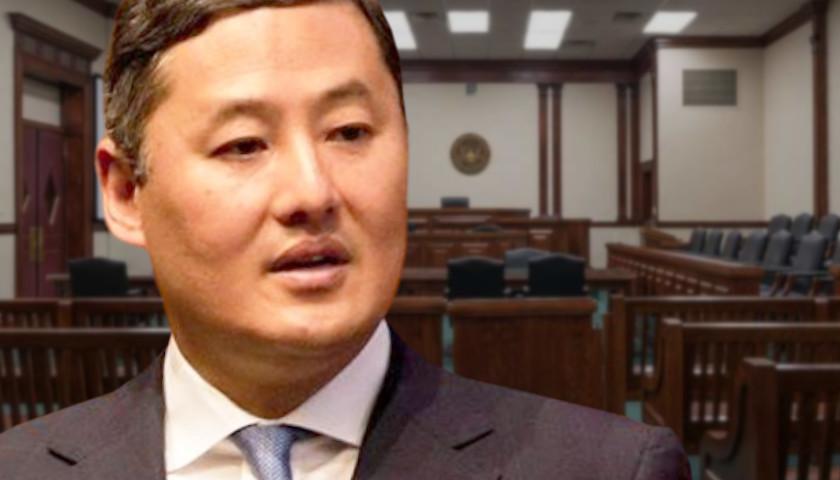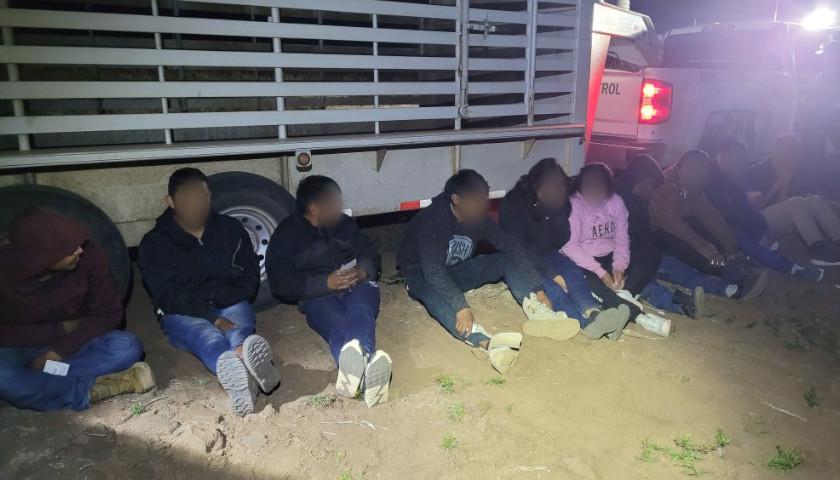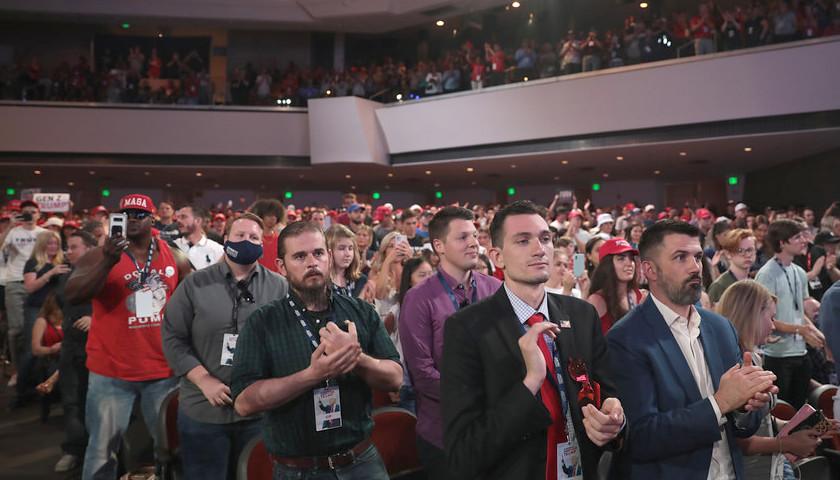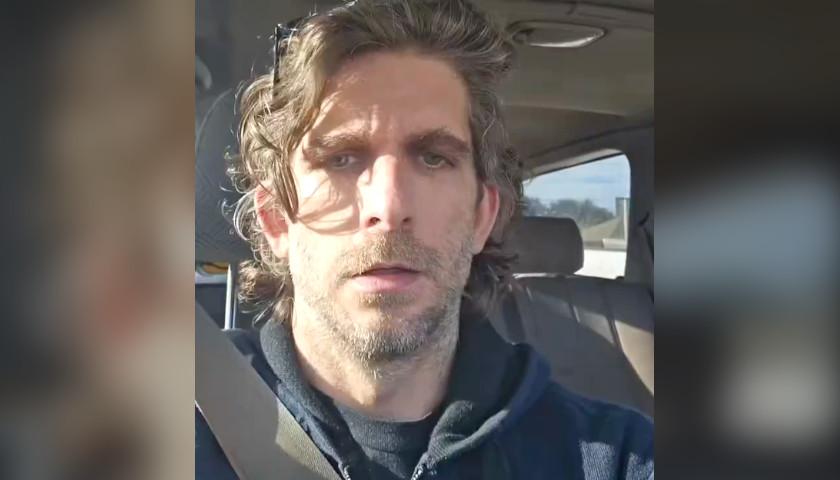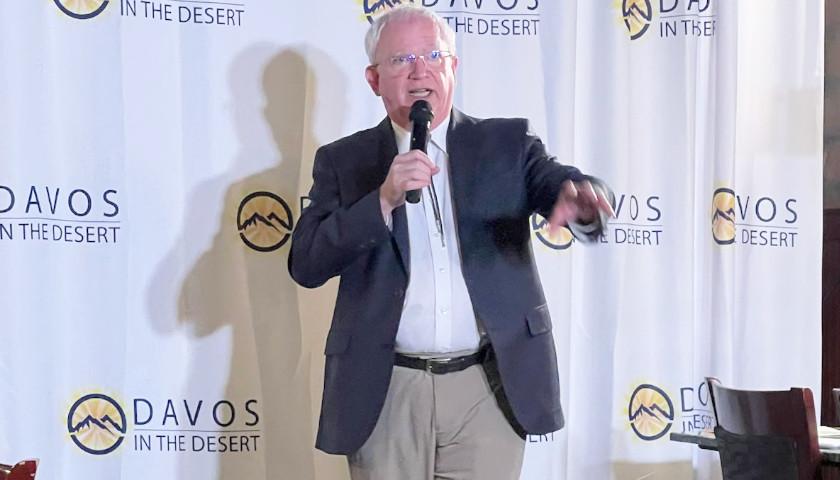The disbarment trial of Donald Trump’s former attorney and constitutional legal scholar, John Eastman, is in its sixth week. Wednesday featured more testimony by Berkeley constitutional law professor John Yoo, who was grilled by State Bar of California attorney Duncan Carling about his opinion that there was no fraud in the 2020 election—the day concluded with some direct examination of Joseph Fried, an auditor who authored the book Debunked? investigating the allegations of election fraud.
Eastman attorney Randy Miller resumed his examination of Yoo (pictured above), questioning him extensively about a law review article he co-authored in 2022, which found that the vice president has substantive authority over accepting or rejecting disputed electoral slates. Yoo discussed what the article said about the 1876 congressional debates over how to handle contested electoral slates, where Representative James Garfield (R-OH) — who later became president — argued that the vice president had a substantive role.
“In Garfield’s view, the power to resolve disputed vote counts lay, in the first instance, with the Vice President,” Yoo said in the article. “That power was not exclusively the Vice-President’s, however, but was subject to congressional regulation.”
Yoo said Garfield indicated it was up to the vice president unless there was legislation otherwise. Representative George Henry White (R-NC) said only the vice president can decide, regardless of what Congress did. Another view expressed by some representatives would leave such disputes up to the states.
Yoo said that Charles Pinckney, a delegate to the 1787 Constitutional Convention, “said Congress should have no role at all” in determining whether to accept disputed electoral slates.
“He thinks Congress is just there to watch,” the law professor said.
He added that future Chief Justice John Marshall went further and argued that Congress should not be able to pass legislation to regulate the resolution of disputed electoral votes. Congress did so anyway, passing the Electoral Count Act in 1887, then adding an amendment to it in 2022 prohibiting the vice president from deciding.
California Bar Disciplinary Judge Yvette Roland, who donated to Democrats while serving on the bench, tried again on Wednesday to stop Yoo from testifying about whether former Vice President Mike Pence had the authority to reject electoral slates. She said it hadn’t been laid out that he would testify on that topic in Eastman’s pleadings. She decided that he could testify about postponing the certification but not rejecting the electors’ slates.
However, Yoo was able to get in his opinion that if Pence did reject electoral slates, it was likely that the courts would refuse to rule on whether he had that authority due to it likely being a nonjusticiable issue, which means the Constitution assigned that power to another branch of government so the courts can’t intervene.
Yoo said University of Texas law professor Sandy Levinson and Duke University law professor Ernie Young concluded in a 2002 law review article that it was non-justiciable.
Eastman’s memo to Trump advising him on how to handle January 6 stated something similar about nonjusticiability.
In his memo, Eastman said, “The main thing here is that Pence should do this without asking for permission – either from a vote of the joint session or from the Court. Let the other side challenge his actions in court, where Tribe (who in 2001 conceded the President of the Senate might be in charge of counting the votes) and others who would press a lawsuit would have their past position — that these are non-justiciable political questions – thrown back at them, to get the lawsuit dismissed.”
Next, Yoo discussed if there were competing slates of electors. Based on all the historical materials he researched, if the governor signed off on one slate with a certificate of ascertainment but the other slate did not have that, then it would be up to the vice president to determine which slate to accept. However, Yoo said that any alternate slate would need to be submitted by another branch of state government, such as the legislature sending a competing version against an original slate signed by the governor.
Carling dug into Yoo’s opinions regarding whether or not there was fraud in the 2020 election. Yoo said previously a few times, including in an article for The Federalist, that he did not believe there was. However, Yoo admitted multiple times during the trial that he was ill-informed about the 2020 election. Despite this admission, Roland still permitted him to testify about the topic. He said he relied on the opinions of officials like former Attorney General William Barr, who said there was no fraud, and the judges who threw out the 60-plus cases challenging the 2020 election.
Yoo said due to not believing there was fraud, he didn’t consider any of the electoral slates to be disputed in 2020. He did acknowledge that in 1796, due to allegations of fraud regarding Vermont’s slate of electors, its slate was disputed, citing a law review article by law professors Bruce Ackerman and David Fontana. He did not state whether any of the fraud allegations were ever proven in court. There was no alternate slate from Vermont.
Carling asked Yoo about several previous presidential elections with minor disputes about electoral slates. Yoo said in 1817, Indiana’s electoral slate was disputed, but it wasn’t clear whether Congress stepped in and decided the controversy.
The law professor said that proposals to give Congress the authority to decide disputes were rejected throughout much of history. He said there was such opposition to giving Congress the authority that members of Congress were fine with letting the vice president have it instead.
Yoo discussed a 2000 law review article by the University of Virginia professor John Harrison called “Nobody for President.” Yoo said Harrison concluded that resolving disputes is the vice president’s responsibility. Harrison said the opposition to Congress deciding disputes was so strong that either the authority is vested with the Supreme Court or the vice president, and Yoo said Harrison doesn’t believe it is the Supreme Court so it defaults to the vice president.
Next, Yoo talked about a law review article from 2002 by Vasan Kesavan on how he said he believes the Electoral Count Act is unconstitutional. Although Kesavan didn’t acknowledge that the vice president has substantive authority over disputed electoral slates, he said Congress can give the vice president that authority at any election.
Yoo concluded his testimony, and Fried was called to the witness stand. Fried explained why he wrote his book, which went over multiple concerns about election fraud and contained the results of his “auditlike procedures” investigating various state elections.
He said he wrote it due to Maricopa County stopping signature verification in the 2020 election, and the Arizona Senate’s independent ballot audit conducted by Cyber Ninjas didn’t result in any investigation into this; they merely recounted the ballots, which didn’t get to the bottom of it or solve anything. He also became concerned since “information started disappearing off the internet;” the state legislatures’ hearings looking into election fraud were being deleted from YouTube.
Carling objected to that testimony as hearsay lacking foundation, and Roland sustained it. She also attempted to keep out much of his testimony since she said he didn’t compile the data himself. Miller argued that when Maricopa County Recorder Stephen Richer testified, he was allowed to testify about things that other people did that he had nothing to do with, whereas at least Fried played a role in the audits. Miller said it was a misrepresentation to say Fried found the information on the internet; he looked at the same data anyone would have looked at, data that is available to everyone. Roland said Miller will need to submit a pleading laying out why Fried has relevant personal knowledge.
The trial, which is live streamed, continues this week and most of next week, unless interrupted by the Georgia prosecution of Eastman. It begins at 10 a.m. Tuesdays through Fridays.
– – –
Rachel Alexander is a reporter at The Arizona Sun Times and The Star News Network. Follow Rachel on Twitter / X. Email tips to [email protected].
Photo “John Yoo” by John Yoo.

